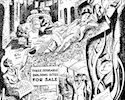::: Conference Home
::: Schedule
::: Participants
::: Papers
::: Contact Details
::: Registration
::: Prize Fellowships in Economics, History, and Politics
::: Joint Center for History and Economics
Participants
Fahad Bishara is a Prize Fellow in Economics, History, and Politics at the Center for History and Economics, Harvard University. His dissertation, "A Sea of Debt: Law, Empire and Commercial Society in the Western Indian Ocean, c. 1850-1940," traces the legal transformation of the Western Indian Ocean through the Arab and Indian settlement and commercialization of the East African coast during the nineteenth century.
Elizabeth Blackmar is a Professor of History at Columbia University. Her research focuses on the emergence and evolution of markets in land and the intersection of property markets and urban history. Her publications include The Park and the People: A History of Central Park (with Roy Rosenzweig, 1992) and Manhattan for Rent, 1785-1850 (1989). Her recent articles are "Of REITS and Rights: Absentee Ownership at the Periphery," in City, Country, Empire: Landscapes in Environmental History (2005) and "Appropriating the Commons: The Tragedy of Property Rights Discourse" in The Politics of Public Space (2005).
Neil Brenner is Professor of Urban Theory at the Harvard Graduate School of Design (GSD) and the coordinator of the newly founded Urban Theory Lab GSD. Among other works, he is the author of New State Spaces: Urban Governance and the Rescaling of Statehood (Oxford University Press, 2004). Brenner's writing and teaching focus on the theoretical, conceptual and methodological dimensions of urban questions, and seeks to extend the fields of critical urban and regional studies, comparative geopolitical economy and radical sociospatial theory.
Desmond Fitz-Gibbon is an Assistant Professor of Modern European history at Mount Holyoke College, specializing in the cultural history of modern Britain. His dissertation, "Assembling the Property Market in Imperial Britain, 1750-1925," investigates the spatial, social and material practices that redefined the meaning of marketable property in imperial Britain's long nineteenth-century.
Joanna Guldi an Assistant Professor of History at Brown University and a Junior Fellow at the Harvard Society of Fellows. Her first book Roads to Power (Cambridge: Harvard University Press, 2011) examines the construction of the British 'infrastructure state,' and she is currently at work on a history of dispossession in northern Europe from the late middle ages.
Emilio Kourí is Professor of History at the University of Chicago and Director of the Katz Center for Mexican Studies. His main scholarly interest is in the social and economic history of rural Mexico since Independence. He is the author of A Pueblo Divided: Business, Property, and Community in Papantla, Mexico (2004). His current research project is an interdisciplinary study of the idea of the "Indian pueblo" in 19th and 20th century Mexican thought, law, and political discourse.
Noam Maggor is a Postdoctoral Scholar in History at Vanderbilt University, where he focuses on the rise of capitalism in the nineteenth century United States. His dissertation, "Politics of Property: Urban Democracy in the Age of Global Capital, Boston 1865-1900" examines the political economy of nineteenth-century American cities in a broad geographical perspective, investigating the intersection of global and local processes on the urban level.
Charles Maier is Leverett Saltonstall Professor of History at Harvard University. He served as Director of the Center for European Studies from 1994 to 2001 and Fall 2006. Among his most recent publications is Among Empires: American Ascendancy and its Predecessors (Harvard University Press, 2006), and he is currently collaborating with William Kirby and Sugata Bose on a world history of the twentieth century and writing on the rise and decline of territoriality and on the history of the modern state from the sixteenth century.
Timothy Mitchell is professor and chair of the Department of Middle Eastern, South Asian, and African Studies at Columbia University. He is a political theorist who studies the political economy of the Middle East, the political role of economics and other forms of expert knowledge, the politics of large-scale technical systems, and the place of colonialism in the making of modernity. Mitchell is the author of Colonising Egypt (1988), Rule of Experts: Egypt, Techno-Politics, Modernity (2002), and most recently, Carbon Democracy: Political Power in the Age of Oil (2011).
Edward Murphy is an Assistant Professor in the Department of History and the Global Urban Studies Program at Michigan State University. His research explores the interrelationship between housing rights, property regimes, domesticity and governance among low-income urban groups, with a primary focus on Chile. Amongst other works, he is an editor of the collection Anthrohistory: Unsettling Knowledge, Questioning Discipline (Ann Arbor: University of Michigan Press, 2011).
Meg Rithmire is currently an assistant professor of business administration in the Business, Government, and International Economy Unit of the Harvard Business School. Her research examines the origins of different development strategies in Chinese cities and the ways in which these strategies have affected outcomes in urban spatial restructuring, property rights over land, and local institutional environments.
Peter Satyanand Samuels is a PhD Candidate in the Department of History at Stanford University. A legal and economic historian of modern South Asia, his dissertation, "The Iron Sovereign: Railway Imperialism and the Origins of Eminent Domain in Modern India, 1850-1900," explores the role of colonial railway enterprise in the emergence of the law of expropriation and compensation for land taken for public infrastructure.
Rebecca Spang is Associate Professor of History at Indiana University Bloomington. She is a historian of eighteenth- and nineteenth-century Europe who has concentrated primarily on the interaction of culture, politics, and consumption. She is the author of The Invention of the Restaurant: Paris and Modern Gastronomic Culture (2000). Her current book project explores the economic and psychic life of symbols, and treats, in part, the interaction between new understandings of paper money and its relationship to the natural economy of land during the French Revolution.
Robert Travers is a specialist of modern British history and the history of the British empire, with a particular focus on colonial India. He is the author of Ideology and Empire in Eighteenth Century India (Cambridge University Press, 2007). His new work focuses on issues of political economy, and how the early colonial regime in India addressed issues of famine, grain markets, land rights, the organization of textile production, money and banking.
Alexia Yates is a Prize Fellow in Economics, History, and Politics at the Center for History and Economics, Harvard University. Her dissertation, "Selling Paris: Real Estate and Commercial Culture in the Fin-de-siècle Capital," explores the politics and practices of private construction in Paris at the turn of the twentieth century. She is currently undertaking a study of the history of land valuation practices in France.







